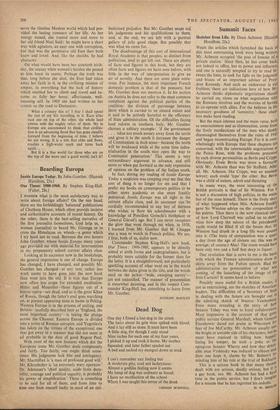Summit Faces
Sketches from Life. By Dean Acheson. (Hamis Hamilton, 21s.) WHEN the articles which furnished the basis 0 this most entertaining book were being written Mr. Acheson occupied 'the post of honour of a private station.' Since then, he has come back, not indeed to office, but to power and influence, and one is naturally tempted to try to read be' tween the lines, to seek for light on the judgment and biases of an important adviser of Presi• dent Kennedy. And such an endeavour is not fruitless; there are indications here of how Mr' Acheson thinks diplomatic negotiations should be carried on, views on what negotiation with the Russians involves and the worries of having to co-operate with allies. For the believer in the necessary goodness of 'summitry,' these char ters make hard reading.
But the main interest and the main value, both as entertainment and as illumination, come from the lively recollections of the men who slowlY disentangled themselves from the ruins of 1945 and began reconstructing Europe. For it is over• whelmingly with Europe that these chapters are concerned, with the interminable negotiations at, the Palais Rose, with the problems presented by such diverse personalities as Bevin and CrinPs' Obviously, Ernie Bevin was more a favourite with Mr. Acheson than was Sir Stafford. After all, Mr. Acheson, like Cripps, was an eminent lawyer; each could 'type' the other. But Bevin was a child of nature, adroit and thrusting In many ways, the most interesting of the British portraits is that of Sir Winston. For it is -not a discussion of high politics, in the main, but of the man himself. There is the lively storY of what happened when Mrs. Acheson franklY, gave Sir Winston advice on the composition 01 his palette. Then there is the now classical story of how Lord Cherwell was called on to deter' mine how deep the saloon of the presidential yacht would be filled if all the booze that' Sir Winston had drunk in a long life were poured into it. (The basis of computation was a quart a day from the age of sixteen on; this was an average, of course.) Alas! The room would have been only two and a half feet deep in liquor.
One revelation that is news to me is the haste with which the Truman administration drew its skirts away from the Fulton speech. Had the administration no premonition of what was coming, of the launching of the image of the Iron Curtain? It seems hard to believe Possibly more useful for a British reader, if not as entertaining, are the sketches of American leaders. The difficulties of a Secretary of State in dealing with the Senate are brought out 10 the admiring sketch of Senator Vandenberg' Even more revealing is the story of hog/ Senator Tobey was won to loyal collaboratiorli Most impressive is the account of that flrea, public servant'General Marshall, whom General Eisenhower dared not praise in Wisconsin f°r fear of Joe McCarthy. Mr. Acheson usually sees the bright or amiable side of his characters, but he must have rejoiced in telling how, hanPilY losing his temper, he took a poke at the egregious Senator Wherry and how that detest: able man Vyshinsky was reduced to silence and' dare one hope it, shame by Mr. Bohlen's re. minding him of his role at the trial of Bukharitl: This is a serious book in that many themes dealt with are serious, deadly serious, but it l' a gay book, too. Mr. Acheson has had a hard
. time in the public service, but I don't imaflin` for a minute that he has regretted his ordeals.
D. W. BROGA1.






























 Previous page
Previous page